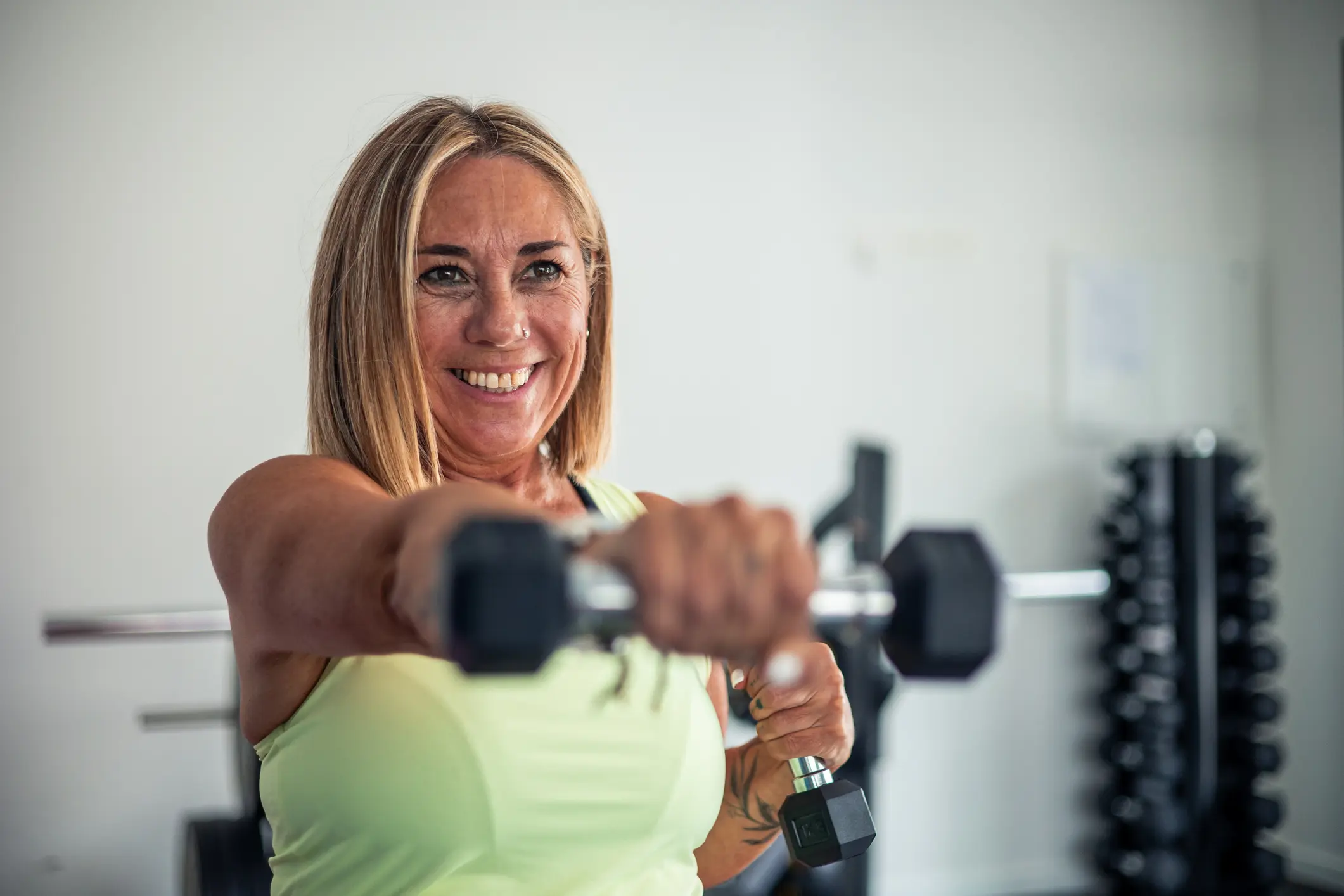
Published on Jun 16, 2025
Last modified on Dec 22, 2025
From Newsroom to Weight Room: Anne Marie Chaker, Author of LIFT, on Reclaiming Strength in Midlife
5 min read
Like many of us, Anne Marie Chaker grew up with a prescriptive representation of what exercise, and femininity, looked like. When she discovered weight lifting as a young mom juggling two daughters and a demanding journalism career, it transformed her life. We sat down with Anne Marie to learn more about the evolution of her fitness journey.
What was your relationship to fitness before you started bodybuilding?
What happened to me is what I think happens to a lot of women. After college—whether you leave behind organized sports or a structured gym routine—suddenly, it’s just… gone. At the time, nothing out there really clicked for me. It was all yoga classes, pilates studios, and running—none of which felt like my vibe. After I had my babies, things started to spiral. I realized I wasn’t taking care of myself—and that neglect came at a cost.
Your journey into bodybuilding began during a turbulent time in your life. What inspired you to take that first step into the gym?
I had just become a single mom and was driving my kids to an out-of-town hockey tournament—station wagon packed with strollers, a hockey bag, and my mom along for support. I remember the whole drive, feeling this deep craving for a drink. That’s when it hit me: I was sliding into addiction, and I needed to find a way out.
When we arrived, I spotted the hotel fitness room—and inside was this hockey mom absolutely crushing it. She was alone, slinging barbells and working resistance bands like a pro. I remember thinking, I’m falling apart and you’ve got it all figured out. I asked her what she did, and she told me she competed in bikini competitions. At first, it sounded wild. But then she explained it was a form of bodybuilding—and that she had a coach. I was intrigued. She gave me the coach’s name, and that connection helped me begin to understand training, nutrition, and structure.
Sometimes these moments arrive quietly. You don’t realize they’re life-changing until much later. But that was one of them.
Was there a specific moment when you realized this hobby had become something transformative for you?
My whole life, I’d approached nutrition and fitness with caution. We’re taught to eat less, be thinner, burn calories. Cardio is good. Weights? Not so much. Movement was always about shrinking, not strengthening.
But everything shifted when I started working with my coach. We realized I wasn’t eating nearly enough—just coffee in the morning, scraps off my toddler’s plate, wine at night, and the occasional binge on Doritos. The biggest surprise? She took cardio off the table completely and had me focus on lifting heavy.
It was a daily regimen of more—more food, more strength, more structure. It went against everything I’d ever learned growing up. But for the first time in my life, I felt at home in my body.
How has strength training translated to reclaiming agency in other areas of your life?
There’s something deeply powerful that happens when I lift weights. No matter how rough my day has been, a few sets in and the endorphins kick in—it’s like flipping a switch. I feel lighter, stronger, more alive. It never fails to amaze me how quickly that shift happens—there’s no drug that can match it.
I’ve also learned a visualization technique from another lifter that’s become part of my ritual. I picture all of life’s chaos—stress, pain, self-doubt—and I imagine physically lifting it off me. That mental shift is just as powerful as the physical one.
So many women still worry that lifting weights will make them bulky or less feminine. I want to help rewrite that story.
As a mother, how has your transformation affected how you talk about strength and health with your daughters?
I’m so much more aware now of the messages women are fed from the moment we’re born. Thin is in the name of the crackers we eat. Skinny is the cut of our jeans. The language is everywhere—on clothing tags, in advertising, even on the back of a salad dressing bottle.
I try to be really mindful of speaking the language of more, not less. “Mommy’s got muscles—that’s a good thing!” I remember one day I was struggling to pull on a pair of jeans that no longer fit. I almost said something negative, but caught myself. My daughter looked at me and said, “I think it’s because your thigh muscles are getting bigger”—and she said it like it was a compliment. And she was right.
What is your advice for someone new to strength training?
First, talk to your doctor—make sure they know you’re starting a new exercise program. Then, join a gym. Most gyms offer a free introductory session with a trainer—take advantage of it. Use that time to build a basic workout plan and learn the foundational lifts.
Don’t worry about how much weight you’re lifting or what anyone else thinks. A lot of women feel intimidated, like they have to look like they know what they’re doing from day one. But here’s the truth: you can get a great strength training workout without even putting weight on the bar. Focus on learning the movements. As you gain confidence, the weight will come.
ANNE MARIE CHAKER is a veteran journalist and professional bodybuilder. During her two-decade career at The Wall Street Journal, she held reporting jobs all over the paper, from the Journal’s regional editions to the Spot News Desk during the September 11 attack. She has covered everything from politics to news events, consumer trends, education, the workplace, and the major sociological shifts of our time. Her new Anne book LIFT: How Women Can Reclaim Their Physical Power and Transform Their Lives is now available for purchase.
READ MORE:


